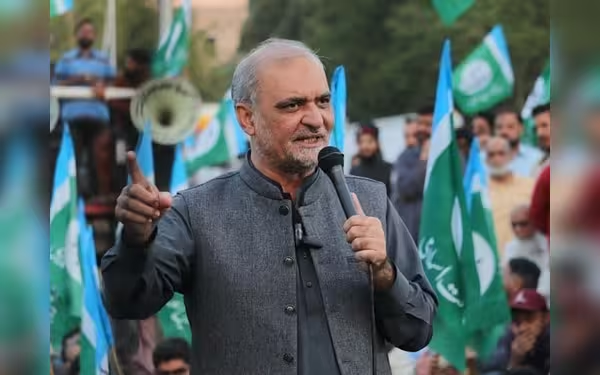Sunday, December 22, 2024 10:15 AM
JI Leader Criticizes Elite Control Over Pakistan's Future
- JI leader highlights elite influence on Pakistan's governance.
- Calls for equitable education access for all children.
- Youth voices essential for shaping Pakistan's future.
 Image Credits: tribune.com.pk
Image Credits: tribune.com.pkJI leader emphasizes the need for equitable governance and education access in Pakistan, urging youth involvement for a better future.
In recent times, the political landscape of Pakistan has been a topic of intense discussion, particularly regarding the influence wielded by a select few individuals. This concern was notably highlighted by the Jamat-e-Islami (JI) supremo during a significant event aimed at empowering the youth. Addressing a large gathering of students participating in the aptitude test for the BanoQabil program, he emphasized the pressing issue of how the country seems to be in the "clutches of a few influential people." This statement resonates with many citizens who feel that the political and economic decisions affecting their lives are often made by a small elite, rather than through a democratic process that includes the voices of the broader population.
During his address, the JI leader also pointed out the substantial education budget allocated for the Sindh province, which stands at over Rs481 billion. This figure is significant, as it reflects the government's commitment to improving educational facilities and opportunities for the youth. However, the JI supremo's remarks suggest that despite this considerable investment, the benefits may not be reaching all students equally. He urged for a more equitable distribution of resources, ensuring that every child has access to quality education, regardless of their background.
The BanoQabil program, which aims to enhance the skills and capabilities of students, is a step in the right direction. It is designed to prepare young individuals for the challenges of the modern workforce. However, the JI leader's concerns highlight a critical point: while programs like BanoQabil are essential, they must be supported by a political environment that prioritizes the needs of the many over the interests of the few.
As Pakistan continues to navigate its complex socio-political landscape, the voices of its youth will play a crucial role in shaping the future. It is imperative for the government and influential leaders to listen to these voices and work towards a more inclusive society. The call for transparency and accountability in governance is not just a demand; it is a necessity for the progress of the nation. In conclusion, the JI supremo's remarks serve as a reminder that true change can only occur when the power dynamics shift from a select few to the collective will of the people, ensuring that every citizen has a stake in the country's future.













